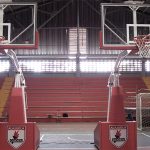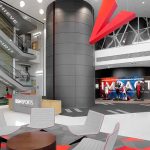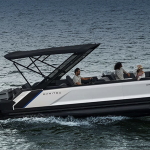Benefiting from strength in basketball and running as well as the payback of its digital investments, The Finish Line, Inc. reported earnings rose 25.3 percent in its fourth quarter ended Mar. 1, to $43 million, or 87 cents a share. Results exceeded Wall Street's consensus estimate of 85 cents.
Revenues reached $518.9 million, an increase of 17.2 percent. Finish Line Brand comparable store sales increased 6.3 percent.
For the full year, earnings rose 7.6 percent to $76.9 million, or $1.56 a share. Non-GAAP diluted earnings per share, which excludes the impact of start up costs related to the launch of Macy’s business, impairment charges and the gain on the sale of an investment, increased 12.9 percent to $1.66. Sales rose 15.7 percent to $1.67 billion with same-store sales at the Finish Line Brand ahead 4.2 percent.
Sales per square foot in Finish Line stores for the year continued the upward trend seen over the last several years, increasing almost 4 percent to $366.
On a conference call with analysts, Glenn Lyon, chairman and CEO, said the year’s results were fueled by a pipeline of innovative products from vendor partners across running and basketball but also the ongoing benefits of a strategy laid out three years ago to transform Finish Line into a leading multidivisional omnichannel retailer. Said Lyon, “We've put the company on a path to deliver sustainable sales and earnings growth and return greater value to our shareholders.”
In the year, digital sales grew 15 percent to approximately $210 million, or 14 percent of Finish Line brand sales.
For the quarter, the 17.2 percent total revenue gain consisted of Finish Line Brand sales that were up 6.7 percent, sales associated with Macy's of $42.4 million and Running Specialty Group sales of $12.6 million versus $7.8 million last year.
By month, comps were 5.2 percent in December, slid 6 percent in January but strongly bounced back with a 14.2 percent gain in February. On the category side footwear comps were up 8.5 percent while the soft goods comp down 6.7 percent. Footwear ASPs increased 2.8 percent.
On the call, Sam Sato, president, Finish Line Brand, said that on the footwear side, men’s was up mid singles, women's up high singles and kids up mid-teens.
“It was encouraging to see our women's business accelerate further into positive territory during the fourth quarter and that our kids business kept up its robust double-digit growth rate,” said Sato.
Running was ahead low-single digits, led by Air Max, Shox, Lunar and especially Free from Nike. Said Sato, “Max Flyknit was a big hit when launched in December and demand remains strong throughout the quarter.”
Springblade by Adidas delivered “great results” and Under Armour's SpeedForm’s sales “have been tremendous.” Brooks “remains a very solid business” and comped positive.
Basketball was up in the mid-teens on a comp basis, and has grown 58 percent on a three-year stack basis. Nike and Jordan again led results. LeBron and KD led Nike’s side, supported by strong demand for performance products such as Hyperdunk and the HyperRev. Jordan saw “across-the-board” strength. On the lifestyle side, “measurable success” was found beyond brand Jordan with key items, specifically Air Force 1 and Roshe Run, both by Nike, as well as retro running styles by New Balance standing out.
Kids were supported by strength in Nike, Jordan and Adidas with “terrific results” also seen from New Balance and Under Armour in the period.
Soft good’s mid-single digit decline was due primarily to its NCAA licensed business, but “bright spots” included bags, shoe care and cold weather apparel from Under Armour and The North Face.
“We have identified opportunities we believe can improve our soft goods in performance including a key focus on key items most important to our customer, improved and purposeful head-to-toe storytelling and leveraging our digital commerce business to offer a broader selection not available in stores,” added Sato.
For the fourth-quarter, digital sales at Finish Line Brand were up 27 percent. Digital traffic continues to grow high double digits with mobile representing nearly 30 percent of the total.
Sato said the digital results reflect “stepped up” efforts to reach customers on a more personal level with conversations via social media having “dramatically increased as we remain focused on fostering this relationship as the go to source for the hottest sneakers.”
Mobile traffic is being maximized to drive sales in the store and online. With customers reaching Finish Line digitally on a more frequent basis, the customer engagement experience is being improved with “more online product exclusives, user-friendly site enhancements and a more holistic approach to omnichannel marketing, again to drive traffic across all channels,” said Sato.
Regarding its Macy’s partnership, Finish Line ended its fiscal year with branded shops in 185 Macy's stores while managing the athletic footwear business in another 477 stores as well as online at macys.com. Sato said its Macy’s partnership had a “solid fourth quarter,” particularly in the Macy's locations where it has its branded shops and staff in place.
“We are excited to enter fiscal 2015 with a greater understanding of the Macy's customers and how to better service her needs through a more curated product offer and customer experience,” said Sato. “These learnings include improvements in sizes and style preference by location, in-stock position on key items and going deeper on the merchandise offered through Macy's.com.”
Finish Line also noted that there has been no cannibalization of its core Finish Line business. In fact, the stores facing both a Finish Line stand-alone location and a branded shop within Macy’s are performing better than the chain average.
Said Lyon, “Our experience in 2014 demonstrated that this partnership is a tremendous opportunity for us to draw new customers to our brand as I said before. These customers are loyal and are reacting positively to an offering they simply did not have prior to the launch of this partnership.”
Lyon said the progress at Running Specialty Group has expanded its customer audience within running as well as the broader active lifestyle community, aided by insights gained through the acquisitions of several elite chains such as Boulder Running Company, Run On!, and Running Spot.
“We have seen that many different activities in addition to running play a significant role in their daily lives,” said Lyon. “We are also gaining a tremendous amount of knowledge on how to develop a strong community presence and cultivate consumer loyalty at a very local level, tactics that we are combining into a suite of best practices and deploying across the group to drive increased productivity.”
It operated 48 RSG locations at the fiscal year’s close, up from 27 at the close of its last fiscal year. That includes 15 added through acquisition, seven openings and one door closed. For the current year, the focus at RSG will again be on combination of organic store openings and acquisitions “to build the critical mass needed to generate the profitability we believe this business is ultimately capable of,” said Lyon.
Regarding its omnichannel efforts, Lyon said Finish Line last year made upgrades to the front and back end of its digital platform, launched new mobile solutions and instituted marketing and consumer outreach programs to drive traffic. Improved handheld functionality and enhanced capabilities of our POS system were added at the store level, leading to improved conversion and increased dollars per transaction throughout the year. Handheld devices by store associates helped speed up customer checkout, sign up loyalty customers and inevitably drive incremental sales. Handhelds represented more than 40 percent of all store credit and debit card transactions in fiscal 2014.
Progress was also made with its multiyear core systems upgrade initiative with its new supply-chain system is now live at the Running Specialty Group.
For 2015, priorities include continuing to improve its digital engagement capabilities, investing in technology and service levels stores to elevate the store experience, and continuing its multiyear core upgrade to its merchandising, CRM and supply-chain systems.
For the fiscal year ending Feb 28, 2015, Finish Line expects comps to be up mid single digits and earnings per share to increase in the high single to low double digit range over fiscal year 2014 non-GAAP diluted earnings per share of $1.66.
It plans to open 15 new Finish Line stores and close 10. It plans to open Finish Line shops in 220 more Macy’s doors this year. The Macy's partnership is expected to generate approximately $175 million to $195 million in sales this fiscal year from both the brick-and-mortar stores and macys.com. Macy's is expected to be modestly accretive for the year.
Running Specialty Group are expected to generate sales between $75 million to $85 million driven by a combination of comp store sales growth plus the acquiring and opening of approximately 15 to 25 new stores. RSG is expected to break even for the current fiscal year.















